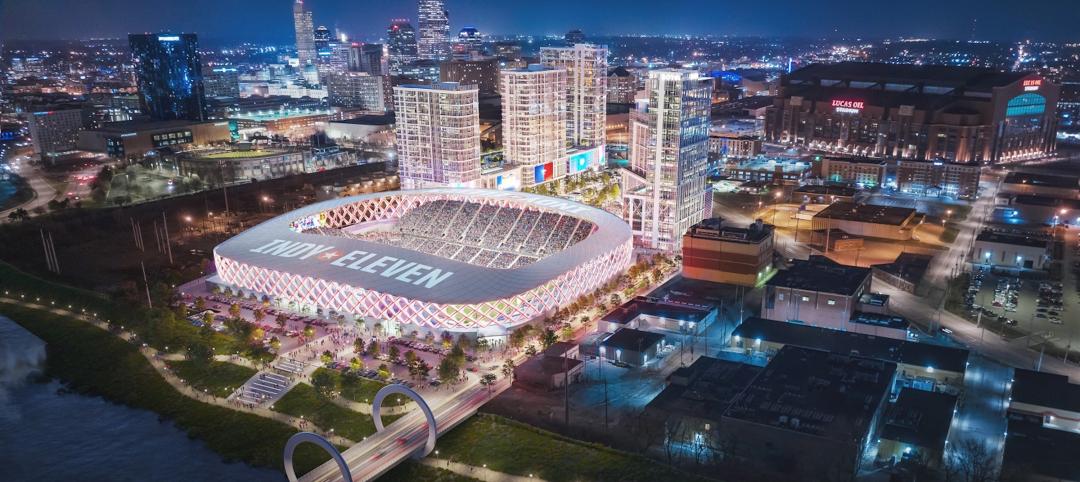A partnership between L&L Holding Co. and Lehman Brothers Holdings Inc. (LBHI) announced the selection of Foster + Partners, led by Pritzker Prize-winning architect Lord Norman Foster, to design an iconic 650,000-sf office tower to be constructed at 425 Park Avenue in the famed Plaza District of Manhattan. The firm will work with the partnership to create an enduring landmark that befits its exclusive location yet is also of its current time and place.
Foster + Partners was selected at the conclusion of an international architects competition, a six-month process involving many of the world’s most acclaimed architecture firms. In addition to Foster + Partners, the partnership selected Rogers, Stirk, Harbour + Partners (Lord Richard Rogers), OMA (Rem Koolhaas) and Zaha Hadid Architects to participate in the final, conceptual design phase of the competition over the recent summer.
L&L Holding Chairman and CEO David Levinson also announced that he and Lord Foster will make a presentation on the conceptual design during the Municipal Arts Society’s 3rd Annual Summit for New York City on Oct. 19. The two-day summit, which starts Oct. 18, will also feature an exhibit featuring the 425 Park Avenue design concepts that were presented by each of the four finalists in the competition.
“We are grateful to each of the firms for the thoughtfulness and creativity they demonstrated throughout the process,” said Levinson. “There is no doubt that each group was fully capable of helping us realize our vision of a 425 Park Avenue tower that redefines the modern office environment while also respecting and enhancing the timeless allure of the Plaza district.”
Levinson added, “We are looking forward to beginning a process in which we translate Foster’s brilliant concept into a modern tower which offers its inhabitants the most functional and environmentally sustainable work environment imaginable, while also addressing the public realm in a way that hasn’t been accomplished in many years.”
Located in the heart of New York’s famed Plaza District, 425 Park Avenue will be the first full-block office development on this historic stretch in nearly half a century. The tower will be situated along Park Avenue’s double-wide boulevard with its attractive green medians, modern art exhibits and broad sidewalks. The district is also recognized as an epicenter of architectural excellence, as exemplified by the nearby Seagram Building and Lever House, which are two of only five structures in New York City to have won AIA’s esteemed “25 Year Award.”
Foster + Partners views the project as an outstanding opportunity to contribute to the existing character of Park Avenue while also responding to the scale and datum of the boulevard and neighboring buildings. Clearly expressing the geometry of its structure, Foster + Partners’ conceptual design features a tapered steel-frame tower rising to meet three illuminated shear walls, adding to the vibrant New York City skyline. The conceptual design also calls for an elegant façade that seamlessly integrates with the innovative internal arrangement that allows for three gradated tiers of column-free floors.
Offering world-class sustainable office accommodation, Foster + Partners envisions a new tower that anticipates changing needs in the workplace with large, open spaces that encompass flexible use. Each of the three tiers – low, medium and high-rise – is defined by a landscaped terrace that would provide excellent amenity for tenants and offer panoramic views across Manhattan and Central Park. At street level, the conceptual design for 425 Park Avenue gives as much to the city as to the people that will work in it with the potential for a large civic plaza marked by significant works of art.
The conceptual design will serve as the framework for a two-year collaborative process with L&L Holding’s project team to create a fully formed architectural and construction plan for the 425 Park Avenue tower. L&L Holding anticipates the start of construction in 2015, with the new 425 Park Avenue tower to be completed by the end of 2017.
Related Stories
Windows and Doors | Mar 5, 2023
2022 North American Fenestration Standard released
The 2022 edition of AAMA/WDMA/CSA 101/I.S.2/A440, “North American Fenestration Standard/Specification for windows, doors, and skylights” (NAFS) has been published. The updated 2022 standard replaces the 2017 edition, part of a continued evolution of the standard to improve harmonization across North America, according to a news release.
AEC Innovators | Mar 3, 2023
Meet BD+C's 2023 AEC Innovators
More than ever, AEC firms and their suppliers are wedding innovation with corporate responsibility. How they are addressing climate change usually gets the headlines. But as the following articles in our AEC Innovators package chronicle, companies are attempting to make an impact as well on the integrity of their supply chains, the reduction of construction waste, and answering calls for more affordable housing and homeless shelters. As often as not, these companies are partnering with municipalities and nonprofit interest groups to help guide their production.
Modular Building | Mar 3, 2023
Pallet Shelter is fighting homelessness, one person and modular pod at a time
Everett, Wash.-based Pallet Inc. helped the City of Burlington, Vt., turn a municipal parking lot into an emergency shelter community, complete with 30 modular “sleeping cabins” for the homeless.
Codes | Mar 2, 2023
Biden Administration’s proposed building materials rules increase domestic requirements
The Biden Administration’s proposal on building materials rules used on federal construction and federally funded state and local buildings would significantly boost the made-in-America mandate. In the past, products could qualify as domestically made if at least 55% of the value of their components were from the U.S.
Industry Research | Mar 2, 2023
Watch: Findings from Gensler's latest workplace survey of 2,000 office workers
Gensler's Janet Pogue McLaurin discusses the findings in the firm's 2022 Workplace Survey, based on responses from more than 2,000 workers in 10 industry sectors.
AEC Innovators | Mar 2, 2023
Turner Construction extends its ESG commitment to thwarting forced labor in its supply chain
Turner Construction joins a growing AEC industry movement, inspired by the Design for Freedom initiative, to eliminate forced labor and child labor from the production and distribution of building products.
Multifamily Housing | Mar 1, 2023
Multifamily construction startup Cassette takes a different approach to modular building
Prefabricated modular design and construction have made notable inroads into such sectors as industrial, residential, hospitality and, more recently, office and healthcare. But Dafna Kaplan thinks that what’s held back the modular building industry from even greater market penetration has been suppliers’ insistence that they do everything: design, manufacture, logistics, land prep, assembly, even onsite construction. Kaplan is CEO and Founder of Cassette, a Los Angeles-based modular building startup.
Airports | Feb 28, 2023
Data visualization: $1 billion earmarked for 2023 airport construction projects
Ninety-nine airports across 47 states and two territories are set to share nearly $1 billion in funding in 2023 from the Federal Aviation Administration. The funding is aimed at help airports of all sizes meet growing air travel demand, with upgrades like larger security checkpoints and more reliable and faster baggage systems.
Seismic Design | Feb 27, 2023
Turkey earthquakes provide lessons for California
Two recent deadly earthquakes in Turkey and Syria offer lessons regarding construction practices and codes for California. Lax building standards were blamed for much of the devastation, including well over 35,000 dead and countless building collapses.
Sports and Recreational Facilities | Feb 27, 2023
New 20,000-seat soccer stadium will anchor neighborhood development in Indianapolis
A new 20,000-seat soccer stadium for United Soccer League’s Indy Eleven will be the centerpiece of a major neighborhood development in Indianapolis. The development will transform the southwest quadrant of downtown Indianapolis by adding more than 600 apartments, 205,000 sf of office space, 197,000 sf for retail space and restaurants, parking garages, a hotel, and public plazas with green space.

















